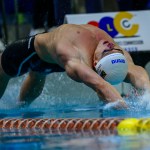It’s not been a great week of PR for the IAAF (International Association of Athletics Federations). Although, if you believe that there is no such thing as bad publicity, perhaps it’s not so bad.
It might have another doping scandal on its hands after it was reported that former Olympic 1,500m champion, Asbel Kiprop, failed an out-of-competition drug test. Kiprop insists that he is clean, but it’s yet another page in the ongoing saga of Kenyan athletics which was rated “non-compliant” by the WADA (World Anti-Doping Agency) before being reinstated prior to the Rio Olympics.
Kenya’s middle and long-distance success has been marred by doping cases involving a number of elite athletes over recent years, with estimates of positive tests sitting at around 50 in the past four years.
Despite this, the IAAF hasn’t done much.
Instead, it has spent the last three years “researching” the effects of testosterone on elite female athletes in a bid to reinstate a policy – or a version thereof – that was set aside by the Court of Arbitration for Sport (CAS) in 2015.
With the Diamond League starting in Doha on Friday – and Caster Semenya set to compete – there’s almost certainly an extra sprinkling of interest following the governing body’s announcement of its new “testosterone limiting” regulations last week.
On Twitter, the IAAF has been relentless in promoting agreement of the new policy, despite it being widely criticised by scientists and even international federations.
Athletics Canada issued a statement saying it has “serious concerns” about the new policy, adding that the country “encourages the full access for all Canadians to participate and compete in athletics, at every level of our sport free of discrimination”.
UK Athletics chairman, Richard Bowker, also raised concerns, telling The Guardian: “Where we currently have got to has raised a lot of questions – and there are a lot of challenges with it as well.”
Athletics South Africa finally confirmed on Thursday that it views the regulations as “skewed” and confirmed that it would be going to CAS if the IAAF does not reverse it.
South African professor, Steve Cornelius, resigned from his role at the IAAF’s Disciplinary Tribunal in protest, with his scathing resignation letter in which he slammed the “warped ideology” shared widely on social media.
But the governing body continued in its pursuit of self-aggrandising confirmation bias that it is doing the “right” thing.
On Wednesday, its Twitter account (screenshot available if the Tweet is deleted) shared an article from the New York Times, calling it a “must read”. The article, written by Doriane Lambelet Coleman, vehemently backs the policy, but the language used in it raises some serious questions.
In its original announcement of the rules, the IAAF said: “In no way are they intended as any kind of judgement on or questioning of the sex or the gender identity of an athlete.”
It might have been a way to deflect from the fact that no other governing body in world sport has so relentlessly tried to police womanhood throughout the years than the IAAF, but whatever moral or intellectual high ground the organisation was trying to claim has long been lost. They contradicted themselves on this matter in the very same press release.
But by sharing Coleman’s article, the IAAF exposed the dishonesty that underpins its intentions. This is about classifying women using a singular marker – there is no other way to spin it.
Here are some selected quotes from the article:
“The IAAF is only concerned with the subset that involves athletes who are biologically male. Specifically, the athletes who are the focus of the IAAF’s rules are those who have testes.
“There is no characteristic that matters more than testes and testosterone.
“Without a women’s category based on sex, or at least these sex-linked traits, girls and women would not have the chance they have now to develop their athletic talents and reap the many benefits of participating and winning in sports and competition.”
Does that sound like a policy that is not questioning somebody’s sex?
More worryingly, nowhere in the regulations published by the IAAF are “testes” ever mentioned. Injecting this dialogue into the conversation through its official Twitter account is worrying because in its regulation, the IAAF vowed to “respect and preserve the dignity and privacy of athletes with DSD”.
Sharing an article that is only going to invite further speculation and scrutiny of athletes isn’t the best way to go about preserving dignity.
Coleman also has a long history of scrutinising athletes, as pointed out by Professor Roger Pielke.
In a piece titled Sex in Sport, Coleman not only speculates about the sex of the podium finishers at the 2016 Rio Olympics, she also refers to Semenya as “single-handedly disturbing the natural hierarchy”.
But that’s not even the worst part. The piece goes further:
“The human tendency to search for perfection in sport is the same tendency that leads sculptors and musicians, scientists and writers, all of us, to search for perfection in our respective spheres.
“It is not an egalitarian trait by any means, but it has yielded significant value for societies in which it is nurtured.
“Thus, sport incentivises the perfection of the athletic female body in its performance and aesthetic aspects, and when this is done right, including without erasing differences in form and function or ‘sexualising female existence,’ the institution celebrates and allows societies to ‘celebrate female strength, skill and excellence’.”
While there is room for rigorous debate around whether the policy is “needed” or not, it is not the role of a governing body which purports to respect the dignity and privacy of athletes to endorse one side of the debate while ignoring the others.
Opposing views are welcome for stimulating discussion, but that is not what the IAAF is doing.
For this reason, the intentions of this policy must be questioned. It was forged in dishonesty and is now being presented as lies. It has moved beyond scientific rigour and is fast escalating into a blatantly discriminatory witch hunt which goes against all the values laid out in the Olympic charter. DM


















 Become an Insider
Become an Insider